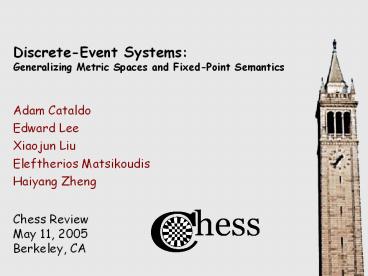Discrete-Event Systems: Generalizing Metric Spaces and Fixed-Point Semantics - PowerPoint PPT Presentation
1 / 25
Title:
Discrete-Event Systems: Generalizing Metric Spaces and Fixed-Point Semantics
Description:
Cantor Metric for Signals. First time at which. the two signals differ. 1 ' ... Cantor metric doesn't capture simultaneity. Tetrics are generalized metrics ... – PowerPoint PPT presentation
Number of Views:21
Avg rating:3.0/5.0
Title: Discrete-Event Systems: Generalizing Metric Spaces and Fixed-Point Semantics
1
Discrete-Event SystemsGeneralizing Metric
Spaces and Fixed-Point Semantics
- Adam Cataldo
- Edward Lee
- Xiaojun Liu
- Eleftherios Matsikoudis
- Haiyang Zheng
2
Discrete-Event (DE) Systems
- Traditional Examples
- VHDL
- OPNET Modeler
- NS-2
- Distributed systems
- TeaTime protocol in Croquet
(two players vs. the computer)
3
Introduction to DE Systems
- In DE systems, concurrent objects (processes)
interact via signals
Process
Values
Event
Signal
Signal
Time
Process
4
What is the semantics of DE?
- Simultaneous events may occur in a model
- VHDL Delta Time
- Simultaneity absent in traditional formalisms
- Yates
- Chandy/Misra
- Zeigler
5
Time in Software
- Traditional programming language semantics lack
time - When a physical system interacts with software,
how should we model time?
- One possiblity is to assume some computations
take zero time, e.g. - Synchronous language semantics
- GIOTTO logical execution time
6
Simultaneity in Hardware
- Simultaneity is common in synchronous circuits
- Example
This value changes instantly
Time
7
Simultaneity in Physical Systems
8
Our Contributions
- We generalize DE semantics to handle simultaneous
events - We generalize metric space concepts to handle our
model of time - We give uniqueness conditions and conditions for
avoidance of Zeno behavior
9
Models of Time
- Time (real time)
Time increases in this direction
- Superdense time Maler, Manna, Pnueli
Supertime increases first in this
direction (sequence time)
then in this direction (real time)
10
Zeno Signals
- Definition Zeno Signal
- infinite events in finite real time
Chattering Zeno Ames
Genuinely Zeno Ames
11
Source of Zeno Signals
- Feedback can cause Zeno
Output Signal
Input Signal
12
Genuinely Zeno
- A source of genuinely Zeno signals
1/2
Delay By Input Value
Output Signal
Input Signal
13
Simple Processes
- Definition Simple Process
Process
Non-Zeno Signal
Non-Zeno Signal
- Merge is simple, but it has Zeno feedback
solutions
- When are compositions of simple processes simple?
14
Cantor Metric for Signals
Distance between two signals
1
First time at which the two signals differ
0
t
15
Tetrics Extending Metric Spaces
- Cantor metric doesnt capture simultaneity
- Tetrics are generalized metrics
- We generalized metric spaces with tetric spaces
- Our tetric allows us to deal with simultaneity
16
Our Tetric for signals
Distance between two signals
First time at which the two signals differ
t
First sequence number at which the two signals
differ
n
17
Delta Causal
Definition Delta Causal Input signals agree up
to time t implies output signals agree up to
time t ?
Process
18
What Delta Causal Means
- Signals which delay their response to input
events by delta will have non-Zeno fixed points
Delta Causal Process
19
Extending Delta Causal
- The system should be allowed to chatter
Delta Causal Process
2
1
0
- As long as time eventually advances by delta
20
Tetric Delta Causal
Definition Tetric Delta Causal 1) Input signals
agree up to time (t,n) implies output signals
agree up to time (t, n 1)
Process
2) If n is large enough, this also implies output
signals agree up to time (t ?,0)
21
Causal
Definition Causal If input signals agree up to
supertime (t, n) then the output signals agree
up to supertime (t, n)
Process
22
Result 1
- Every (extended) delta causal process has a
unique feedback solution
Delta Causal Process
Unique feedback solution
23
Result 2
- Every network of simple, causal processes is a
simple causal process, provided in each cycle
there is a delta causal process - Example
Delay
Non-Zeno Output Signal
Merge
Non-Zeno Input Signal
24
Conclusions
- We broadened DE semantics to handle superdense
time - We invented tetric spaces to measure the distance
between DE signals - We gave conditions under which systems will have
unique fixed-point solutions - We provided sufficient conditions under which
this solution is non-Zeno - http//ptolemy.eecs.berkeley.edu/papers/05/DE_Syst
ems
25
Acknowledgements
- Edward Lee
- Xiaojun Liu
- Eleftherios Matsikoudis
- Haiyang Zheng
- Aaron Ames
- Oded Maler
- Marc Rieffel

